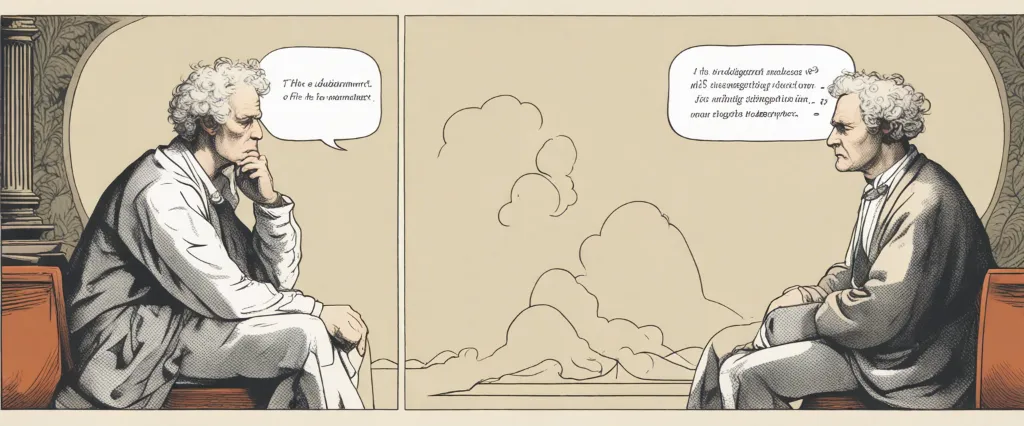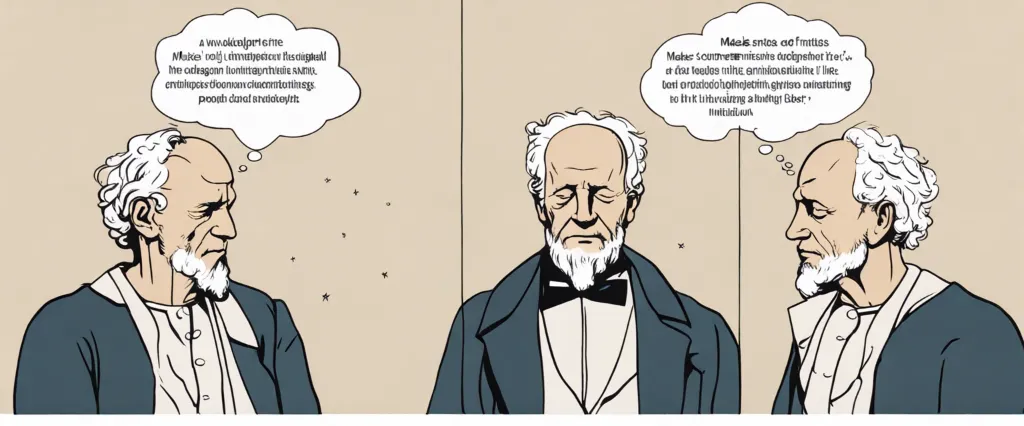——The Wisdom of Life by Arthur Schopenhauer & Sophie’s World by Jostein Gaarder

Literature has long served as a gateway to understanding the complex intricacies of the human condition. Within its realm, philosophical novels have held a peculiar allure, captivating readers with their evocative narratives and thought-provoking ideas. Arthur Schopenhauer’s “The Wisdom of Life” and Jostein Gaarder’s “Sophie’s World” exemplify this captivating genre, exploring the profound questions that underpin human existence. Both books delve into the mysteries of existence, unveiling different perspectives on the meaning, purpose, and intricacies of life.
The Wisdom of Life” by Arthur Schopenhauer is a timeless philosophical work that offers a profound insight into the fundamental questions of human existence. Schopenhauer, an influential German philosopher of the 19th century, delves into the nature of life itself, examining the interplay between desires, happiness, and suffering. In contrast, “Sophie’s World” by Jostein Gaarder, a Norwegian novelist and philosopher, takes readers on a captivating journey through the history of Western philosophy. This fictional novel tells the story of Sophie Amundsen, a fourteen-year-old girl, who embarks on an extraordinary adventure when mysterious philosophical letters start to appear in her mailbox.
Though distinct in their narrative approaches, both Schopenhauer and Gaarder share a common goal – to explore existential questions through their writing. Their unique perspectives allow readers to traverse the depths of philosophy, unraveling the essence of life, and raising profound queries about our existence.
This comparative study aims to analyze and juxtapose the intricate philosophical ideas presented in “The Wisdom of Life” and “Sophie’s World.” By examining the works side by side, certain parallels and divergences in their approach to elucidating the human condition will come to light. Moreover, this study will delve into the themes, philosophies, and literary elements employed by these two influential writers, presenting a holistic understanding of their work as well as the philosophical queries they raise.
In dissecting these two remarkable texts, we will navigate through the labyrinthine corridors of human existence, contemplating the purpose and significance of our lives. Together, we will explore whether Schopenhauer’s contemplative exposition of the nature of life aligns with Gaarder’s engaging narrative style. Each work’s distinct merits, strengths, and philosophical groundings will be unraveled, enhancing our comprehension of the multifaceted issues they confront.
Ultimately, this comparative study will shed light on the central themes ingrained within “The Wisdom of Life” and “Sophie’s World,” enabling readers to better grasp the philosophical notions presented by these celebrated writers. Through a comprehensive analysis of their unique perspectives, we can gain a deeper appreciation for the complexities of our own existence and reflect upon the profound questions that have stirred humanity since time immemorial.
Brief Summary of Two Books
The Wisdom of Life by Arthur Schopenhauer
The Wisdom of Life” is a philosophical work by German philosopher Arthur Schopenhauer. The book explores the nature of happiness and offers insights on how to live a fulfilling life. Schopenhauer delves into several aspects of human existence, including love, relationships, work, and the pursuit of knowledge. He emphasizes the importance of understanding oneself and one’s desires in order to find contentment. Schopenhauer also discusses the influence of external factors and societal expectations, urging readers to make choices based on their own needs and values. Throughout the book, he presents a pessimistic worldview, arguing that true happiness can be achieved by managing one’s desires and expectations, rather than constantly seeking new sources of pleasure. Overall, “The Wisdom of Life” is a philosophical examination of the human condition and offers guidance on how to navigate life’s challenges in order to live a more meaningful existence.
Sophie’s World by Jostein Gaarder
Sophie’s World is a philosophical novel written by Jostein Gaarder. The story follows a 14-year-old girl named Sophie Amundsen, who begins receiving mysterious letters addressing philosophical topics and existential questions. As her curiosity grows, she embarks on a journey to discover the origins of existence, the nature of reality, and the meaning of life.
Through the guidance of an enigmatic philosopher named Alberto Knox, Sophie learns about the history of philosophy, starting from the ancient Greek thinkers to more modern philosophers. They explore various schools of thought such as the pre-Socratic philosophers, Descartes, Kant, Marx, and many others.
As the story progresses, Sophie starts to question the world she lives in and her own place in it. She discovers that she is herself a character in a story created by Alberto, who is a figment of another philosopher’s imagination. Sophie realizes that she is just a construct of Alberto’s mind, trapped in a fictional world.
The novel deals with profound themes like the nature of reality, the existence of God, the philosophy of mind, and the purpose of life. Sophie’s journey ultimately leads her to question her own existence and confront the philosophical questions that have puzzled thinkers for centuries.
Sophie’s World not only provides an engaging narrative but also serves as an accessible introduction to the history of philosophy, making complex concepts easier to comprehend for readers of all ages. The book aims to encourage readers to take an active role in contemplating and questioning the nature of reality and the complexities of human existence.
Comparison between Two Books

Similarities in Know Yourself
The Wisdom of Life by Arthur Schopenhauer and Sophie’s World by Jostein Gaarder share a common theme of understanding one’s self and the importance of self-reflection. Both books explore the concept of “knowing yourself” and provide valuable insights into this process.
In The Wisdom of Life, Schopenhauer discusses the significance of self-awareness in leading a fulfilled life. He emphasizes the idea that individuals should deeply introspect and understand their own desires, strengths, and weaknesses. According to Schopenhauer, self-knowledge allows one to make better choices, avoid unnecessary suffering, and create a meaningful existence.
Similarly, Sophie’s World also advocates for the exploration of self-knowledge. The protagonist, Sophie, embarks on a philosophical journey in which she encounters various thinkers and engages in discussions about fundamental questions of life. Through this journey, Sophie begins to question her own beliefs and develops a deeper understanding of herself. The book highlights the importance of self-reflection as a means to develop personal growth, critical thinking, and individuality.
Both books recognize that self-discovery is not an easy task. They acknowledge the complexity of human nature and the challenges that come with truly knowing oneself. Schopenhauer and Gaarder stress the value of contemplation, introspection, and a willingness to challenge one’s own beliefs and assumptions.
Moreover, these texts also emphasize that self-knowledge is not an endpoint but rather an ongoing process. Both Schopenhauer and Gaarder suggest that self-awareness requires continuous questioning, reflection, and exploration of one’s thoughts, emotions, and actions.
In summary, The Wisdom of Life and Sophie’s World converge in their focus on the importance of self-knowledge. Both books acknowledge the benefits of understanding oneself, and highlight the need for self-reflection, introspection, and a willingness to question one’s own beliefs. They underscore that self-knowledge is not an end goal but rather an ongoing journey that contributes to personal growth and a more meaningful existence.
Divergences in Know Yourself
The Wisdom of Life by Arthur Schopenhauer and Sophie’s World by Jostein Gaarder are two influential philosophical works with distinct perspectives on various topics. When examining the concept of “Know Yourself,” the books differ in their approaches and emphasis.
In The Wisdom of Life, Schopenhauer seeks to provide practical guidance on how to navigate life. He argues that self-awareness is crucial for personal fulfillment and achieving happiness. According to Schopenhauer, individuals must understand their desires, strengths, and weaknesses in order to make informed choices. He emphasizes introspection and self-reflection as tools to uncover our true selves. Schopenhauer believes that knowing oneself leads to true contentment as it allows individuals to align their actions with their internal values.
On the other hand, Sophie’s World offers a fictional narrative that explores the history of philosophy. Gaarder employs a unique approach by introducing complex philosophical concepts through the eyes of a young girl named Sophie. While the book touches on various philosophical ideas, the theme of “Know Yourself” is not explicitly highlighted. Gaarder’s focus lies more on exploring the role of philosophy in understanding the world and contemplating existential questions. The readers are encouraged to question and think critically about life’s mysteries, but the specific notion of self-knowledge takes a backseat compared to other philosophical inquiries.
Therefore, the divergence between The Wisdom of Life and Sophie’s World regarding “Know Yourself” lies in their treatment of this concept. Schopenhauer’s text provides a direct and practical exploration of self-awareness, emphasizing its importance for personal growth and happiness. In contrast, Sophie’s World offers a broader overview of philosophy as a whole, using different philosophical ideas to stimulate thought and intellectual curiosity, without delving deeply into the specific notion of self-knowledge.

Conclusion
Both The Wisdom of Life by Arthur Schopenhauer and Sophie’s World by Jostein Gaarder are highly regarded philosophical works, but their focuses and styles differentiate them.
The Wisdom of Life delves into Schopenhauer’s philosophical perspectives on human existence, happiness, and the pursuit of a meaningful life. It dwells heavily on Schopenhauer’s pessimistic worldview, which may not resonate with everyone. However, it offers profound insights into finding purpose and meaning in life, making it a compelling read for those interested in existential questions.
Sophie’s World, on the other hand, introduces philosophy through a unique narrative format. It follows the story of a teenage girl named Sophie who receives mysterious letters describing various philosophical concepts and thinkers. As Sophie explores these concepts, the reader accompanies her on a journey through the history of philosophy. It is an engaging book that provides a comprehensive overview of Western philosophical ideas in a relatable and accessible manner.
Ultimately, the worthiness of these books depends on your personal interests and what you seek to gain from reading. If you prefer a deep dive into philosophical reasoning on topics such as existence and happiness, The Wisdom of Life would be more suitable. However, if you are new to philosophy and wish to explore its ideas through an engaging story, Sophie’s World could be a more enjoyable and educational choice.


